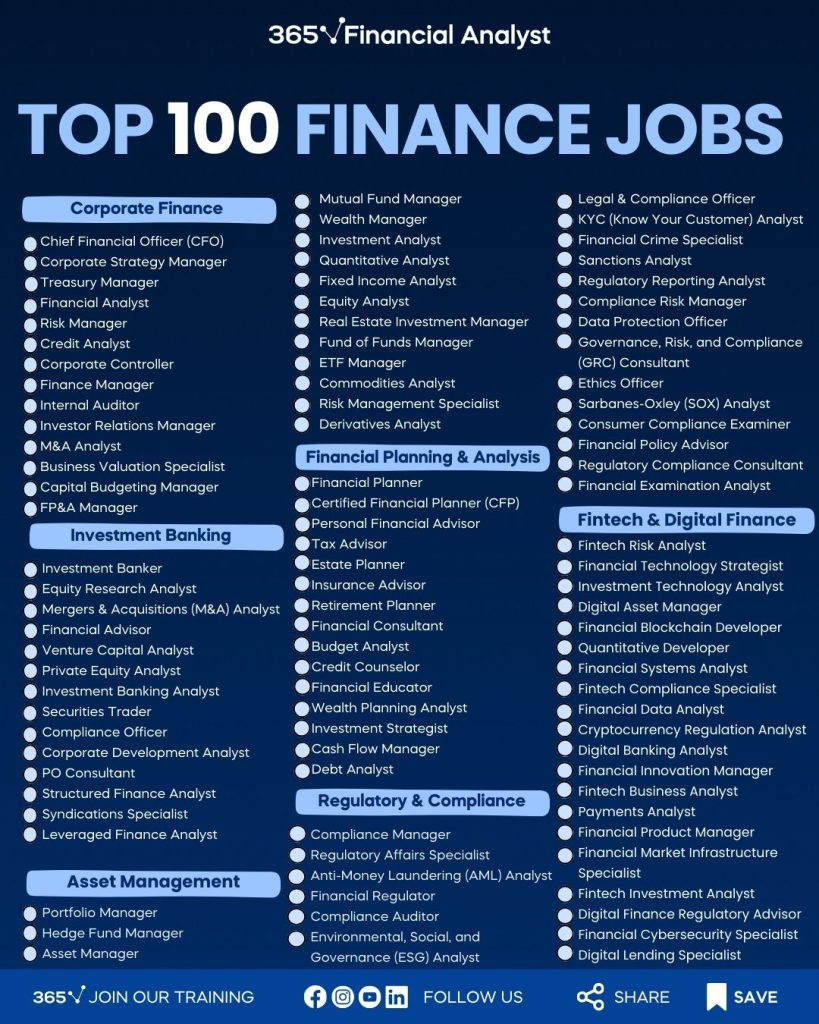How Many Jobs Are Available in Finance?
Curious about how many jobs are available in finance? Our comprehensive guide explores the vast opportunities in the finance industry, highlighting key trends, salary insights, and essential skills for aspiring professionals. Learn about the demand for jobs in the finance industry, potential career paths, and how to boost your prospects.
Join over 2 million professionals who advanced their finance careers with 365. Learn from instructors who have worked at Morgan Stanley, HSBC, PwC, and Coca-Cola and master accounting, financial analysis, investment banking, financial modeling, and more.
Start for FreeOne of the most frequent questions job seekers ask is, “How many jobs are available in finance?” It’s a common concern, and understandably so, as people look for rewarding career paths with solid prospects.
I can relate to this apprehension. Ten years ago, as I was nearing the end of my master’s in finance, I found myself nervously evaluating various jobs in the finance industry and questioning whether pursuing this degree had been the right choice.
In this article, I share my thoughts, along with several vital statistics and trends that can help you clarify the landscape of possible finance careers.
Key Highlights
- Growing Demand: Jobs in the finance industry are in high demand, with financial analyst positions in the US projected to grow by 8% from 2022 to 2032, outpacing the average growth rate.
- Diverse Opportunities: The industry offers a wide array of possible finance careers, from investment banking to asset management, providing roles that cater to various skills and interests.
- Competitive Salaries: Jobs in finance are among the highest-paying across all sectors, with roles like CFOs and investment bankers earning top salaries.
- Industry Resilience: The impact of AI on finance jobs is significant but not threatening. While AI enhances capabilities, the need for human judgment and regulatory compliance keeps finance roles secure.
- Hands-On Learning: 365 Financial Analyst offers tailored courses to equip aspiring finance professionals with the essential skills needed to excel in their careers.
Table of Contents
- Are Finance Jobs in Demand?
- How Many Jobs Are Available in Finance?
- Finance Jobs List
- How Much Do People in Finance Make?
- The Impact of AI on Finance Jobs
- Is It Hard to Get a Job in Finance?
- What’s Next?
- FAQs
Are Finance Jobs in Demand?
Yes, careers in finance are highly sought after. The sector is continuously expanding, with fresh opportunities arising as the industry develops. Jobs for financial analysts in the US are projected to increase by 8% from 2022 to 2032, surpassing the average growth rate of 3%.
This projection means there will be about 27,400 job openings for financial analysts each year throughout the decade. The median finance salary last year was $99,890.
We see similar trends in other key jobs in the finance industry, with personal finance advisors expected to experience the highest growth at 13% over the same period. These patterns are expected to be reflected globally.
At the same time, gaining practical experience can be daunting. Early in my career as a finance intern, I found it challenging to master Excel, update my accounting skills, and create financial models. It took two internships and several months in my first full-time role before I felt competent.
So, is finance a good career path?
Absolutely! That was my motivation for founding 365 Financial Analyst—to provide a complete training that equips you with the essential skills for your career in finance.
Bonus Resource: Watch our YouTube video, ”Is Finance a Good Career Path,” to learn more about job prospects and market trends.
How Many Jobs Are Available in Finance?
The short answer is “more than enough.” In fact, the finance jobs list can be extensive and constantly evolving with the latest advancements.
Finance Job Opportunities
Every business needs a finance team, or at least one person, to manage financial planning, treasury, financial analysis, and accounting. Large companies have thousands of employees dedicated to these roles. If you have strong financial skills and a solid resume, you can build a career in finance at your ideal company.
Beyond traditional companies, many financial institutions are looking for qualified professionals. These include commercial and investment banks, asset management firms, private equity and venture capital funds, fintech startups, and more. Each of these organizations offers a variety of possible finance careers to pursue, such as:
- Commercial Banker: Assessing clients’ creditworthiness.
- Investment Banker: Handling mergers and acquisitions (M&A) deals, initial public offerings (IPOs), restructuring processes, and trading financial securities.
- VC Analyst: Evaluating startups and analyzing their business models.
- Asset Manager: Assisting clients in building optimal portfolios based on their needs and risk tolerance.
What finance career is right for you depends on your interests, skills, and long-term goals. You can even pave the way to leadership positions in major organizations. It can lead to roles such as CFO and even CEO. With the right finance skillset, the opportunities for a career in finance are numerous and promising.
However, securing and advancing in these roles requires you to excel at your job. You must show recruiters and colleagues that you are prepared and dependable.
How Many Jobs Are Available in Finance in the USA?
The Finance and Insurance industry’s market size in the US reached $6.0 trillion in revenue in 2023. grew at an average annual rate of 1.3% between 2018 and 2023, with a 0.2% increase in 2023.
Are finance jobs in demand and on the rise in the USA?
On average, Finance and Insurance businesses in the USA now employ more workers than five years ago, with an average of 6.2 employees per business. Employment in the industry grew by 1% annually between 2018 and 2023, reaching 7,605,892 people in 2023.
Finance Jobs List
The jobs in the finance industry are diverse, with various roles catering to different skills and interests.
Here’s a finance jobs list of the top 100 finance jobs:

Roles in finance can vary by industry, but the core responsibilities typically remain consistent.
How Much Do People in Finance Make?
A finance salary can vary widely depending on the specific role, level of experience, and location. Jobs in the finance industry are among the highest paying across all sectors.
- Financial Analyst Salary: According to the Bureau of Labor Statistics, the median pay for financial analysts in the US was $99,890.
- Investment Banking Analyst Salary: The average investment banking analyst salary is highly competitive, often starting at around $70,000 to $90,000 annually, with significant bonuses.
- Financial Analyst at Goldman Sachs Salary: Financial analysts at top firms like Goldman Sachs can expect starting salaries in the range of $80,000 to $100,000, with potential bonuses.
- Finance Salaries in Major Banks: Salaries in major banks vary, but roles like commercial bankers, asset managers, and financial planners are all well-compensated.
Here’s an overview of the top 10 highest paid finance jobs:
| Finance Job Title | Salary Range |
| Chief Financial Officer (CFO) | $142,000 – $250,000 (Average: $187,000) |
| Chief Compliance Officer (CCO) | $91,000 – $278,000 (Average: $159,000) |
| Investment Banker | $108,000 – $201,000 (Average: $144,000) |
| Portfolio Managers | $99,000 – $167,000 (Average: $129,000) |
| Hedge Fund Managers | $94,000 – $160,000 (Average: $122,000) |
| Credit Risk Managers | $100,000 – $125,000 |
| Economists | $80,000 – $200,000 (Average: $115,000) |
| Financial Analyst | $95,000 – $160,000 |
| Financial Advisor | $80,000 – $148,000 |
| Accountant | $78,000 – $132,690 |
The Impact of AI on Finance Jobs
You might be curious about the impact of AI in finance. Will AI replace finance jobs? The short answer is no, especially not in the foreseeable future.
Here’s why:
- Regulation: The finance industry is highly regulated, and many decisions that require judgment and ethical considerations—which are integral to most roles in finance—are unlikely to be handed over to AI.
- Human Preference: Financial decisions often involve large sums of money and considerable risk. Clients and stakeholders usually prefer to interact with human professionals when accountability is at stake.
- Enhanced Capabilities: For jobs in the finance industry, AI will likely improve our ability to process information but won’t replace the need for human decision-making and business acumen.
Is It Hard to Get a Job in Finance?
Breaking into finance can be challenging due to its competitive nature, but with the right skills, preparation, and determination, it is definitely achievable.
One effective way to build a solid career in finance is by earning a Chartered Financial Analyst (CFA) or CPA designation. According to the Accounting Institute for Success (AIS), less than 5% of finance professionals hold these credentials, yet they significantly improve career prospects.
What’s Next?
There are a wide variety of finance job titles available for those dedicated to continuous learning and professional development, with many companies actively seeking skilled individuals. However, succeeding in this competitive field requires thorough preparation and a strong commitment to growth.
If you’re determined to break into finance and acquire the technical skills and certifications needed for success, enroll for our 365 Financial Analyst Program—specifically tailored to get you job-ready.
FAQs
There are more than enough jobs in the finance industry, spanning various roles in companies, banks, asset management firms, and fintech startups. Nearly 8 million people are employed in finance in the US as of 2023.
Yes, there is a high demand for finance jobs. Financial analyst positions, for instance, are expected to grow by 8% from 2022 to 2032.
A significant percentage of finance majors secure jobs in the finance industry, especially those with practical skills and relevant certifications.
While the finance industry is competitive, having the right skills, certifications, and practical experience greatly enhances your chances of finding a job.
